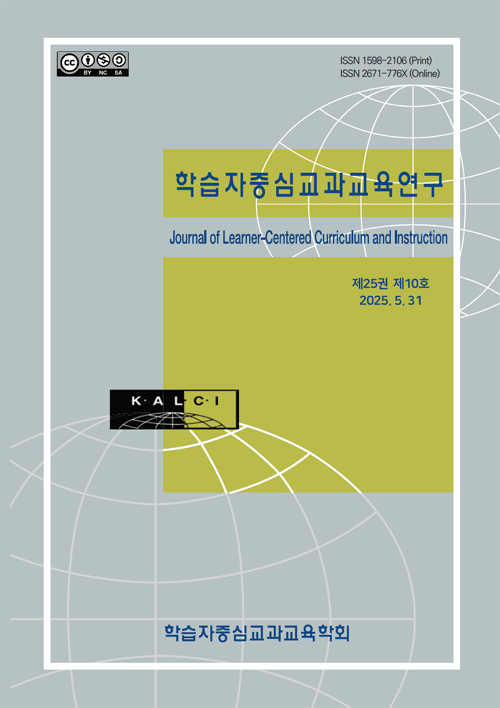- 영문명
- The Mediating Effects of Negative Parenting Attitudes on the Relationship Between Child-Reported ADHD Symptoms and Peer Relationships
- 발행기관
- 학습자중심교과교육학회
- 저자명
- 황민정(Minjung Hwang) 김윤희(Yunhee Kim)
- 간행물 정보
- 『학습자중심교과교육연구』제25권 10호, 1004~1024쪽, 전체 21쪽
- 주제분류
- 사회과학 > 교육학
- 파일형태
- 발행일자
- 2025.05.31

국문 초록
목적 본 연구에서는 아동이 보고하는 ADHD 증상과 또래관계와의 관계에서 부정적 양육태도의 매개효과를 확인하고자 하였다.
방법 초등학교 두 곳의 5~6학년 아동 총 340명을 대상으로 ADHD 증상, 또래관계, 부정적 양육태도를 측정하는 척도를 사용하여 오프라인 설문을 실시하였다. 이를 토대로 아동이 보고하는 ADHD 증상과 또래관계에서 부정적 양육태도가 매개역할을 하는지 검증하기 위해 SPSS Statistics 22.0(IBM Co., Armonk, NY)와 AMOS 29.0를 사용하여 분석을 실시하였다.
결과 첫째, 아동이 보고하는 ADHD 증상은 또래관계와 부적상관을, 부모의 부정적인 양육태도에는 정적상관으로 영향을 미치며, 부모의 부정적인 양육태도와 또래관계는 유의한 부적상관이 있는 것으로 나타났다. 둘째, 아동이 보고하는 ADHD 증상과 또래관계에서 부모의 부정적인 양육태도가 부분매개하는 것으로 나타났다. 셋째, 아동이 보고하는 ADHD 증상의 하위요인인 주의력결핍과 또래관계와의 관계에서 부모의 부정적인 양육태도가 부분매개하는 것으로 나타났다. 넷째, 아동이 보고하는 ADHD 증상의 하위요인인 과잉행동/충동성과 또래관계와의 관계에서 부모의 부정적인 양육태도가 완전매개하는 것으로 나타났다. 이는 아동의 주의력결핍과 과잉행동/충동성이 높을수록 부모의 부정적인 양육태도를 더 증가시키고, 또래관계에서의 부정적인 영향을 증가시키는 것으로 나타났다.
결론 아동의 또래관계에 영향을 미치는 주요변인 중 아동이 보고하는 ADHD 증상을 하위유형에 따라 부모의 부정적 양육태도와 연계하여 모형으로 설명하였다. 아동의 또래관계 문제가 갈수록 증가하는 추세에서 아동의 또래관계 형성은 아동이 보고하는 ADHD 증상에 대한 부모의 양육태도가 매우 중추적인 역할을 담당하고 있음을 제시하고 있다. 연구결과를 토대로 논의 및 시사점을 제시하였다.
영문 초록
Objectives This study aimed to confirm the mediating effect of negative parenting attitudes on the relationship between ADHD symptoms reported by children and peer relationships.
Methods A total of 340 children in grades 5 and 6 from two elementary schools were administered an offline survey using scales measuring ADHD symptoms, peer relationships, and negative parenting attitudes. Analyses were conducted using SPSS Statistics 22.0 (IBM Co., Armonk, NY) and AMOS 29.0 to examine the mediating role of negative parenting attitudes on child-reported ADHD symptoms and peer relationships.
Results First, child-reported ADHD symptoms were negatively related to peer relationships and positively related to parental negative parenting attitudes, and there was a significant negative relationship between parental negative parenting attitudes and peer relationships. Second, parental negative parenting attitudes partially mediated the relationship between child-reported ADHD symptoms and peer relationships. Third, negative parenting attitudes partially mediated the relationship between child-reported ADHD symptoms, a subcomponent of inattention, and peer relationships. Fourth, negative parenting attitudes fully mediated the relationship between the child-reported subcomponent of ADHD symptoms, hyperactivity/impulsivity, and peer relationships. This means that the higher the child's inattention and hyperactivity/impulsivity, the more negative parenting attitudes, and the more negative peer relationships.
Conclusions Among the main variables affecting children's peer relationships, child-reported ADHD symptoms were modeled in relation to negative parenting attitudes by subtype. The results suggest that parenting attitudes play a pivotal role in the development of children's peer relationships in light of the increasing trend of peer relationship problems in children. Discussion and implications are presented based on the findings.
목차
Ⅰ. 서론
Ⅱ. 연구 방법
Ⅲ. 연구 결과
Ⅳ. 결론 및 제언
참고문헌
키워드
해당간행물 수록 논문
참고문헌
최근 이용한 논문
교보eBook 첫 방문을 환영 합니다!

신규가입 혜택 지급이 완료 되었습니다.
바로 사용 가능한 교보e캐시 1,000원 (유효기간 7일)
지금 바로 교보eBook의 다양한 콘텐츠를 이용해 보세요!


